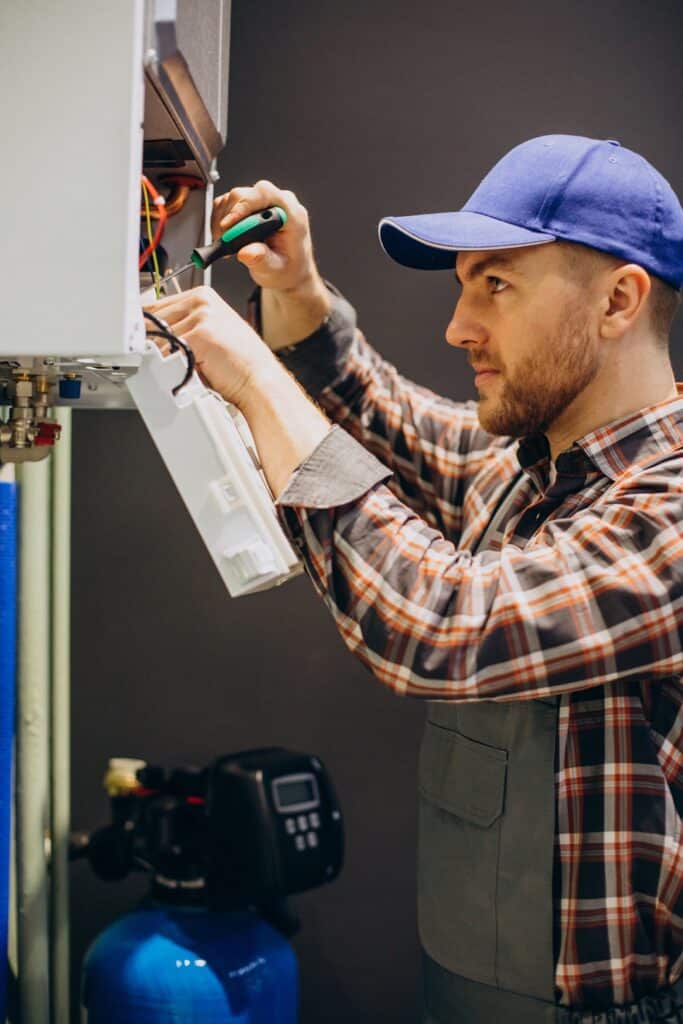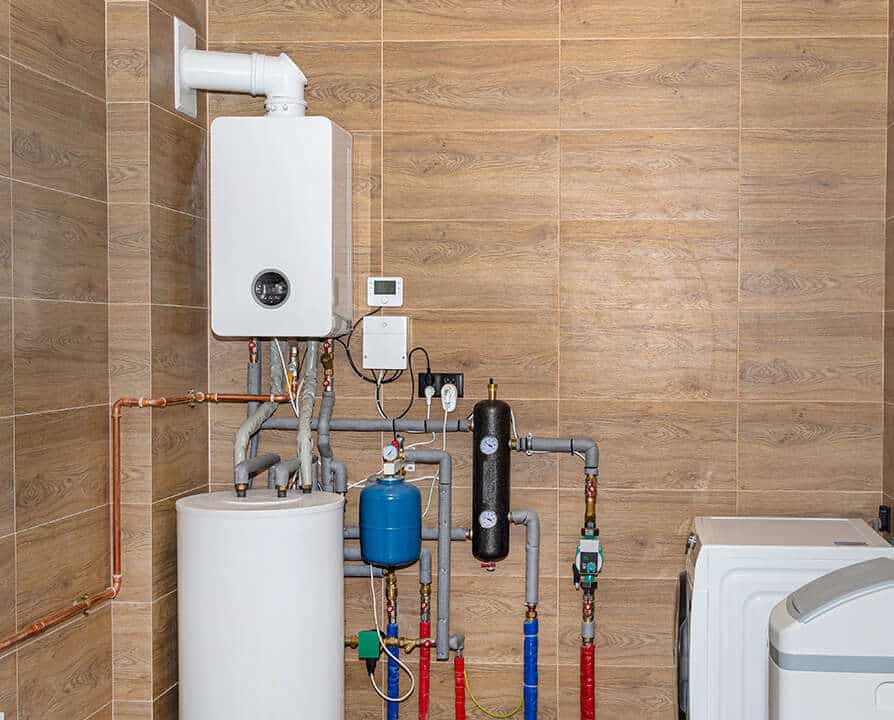Table of Contents
The UK has always been on top of the list when it comes to choosing new boilers for heating homes in winters. Making your living a cosy life on budget in coldest temperatures of up to -18°C is like finding the needle in the haystack. But modern boiler technology has solved this mystery.
These combi boilers provide consistent heating while using minimal energy. Although they cost much on installation and maintenance, ultimately they provide the value of money. However, a million pound question comes: how long does a boiler last? On average, boilers in the UK have a life of 10 to 12 years.
However in Germany, boilers that are over 20 years old are common (yes, they are the same boilers). We can see that a boiler may be done for good after 20 years but not after 10. Because we tend to buy new things too often, 75% of gas homes have boilers that are less than 12 years old. In 10 years, heat pumps will keep 18 million people from having to get new boilers.
If you just bought a new boiler or are thinking about getting a new one, you may be wondering how long the average one lasts. If you service and maintain your home boiler regularly, it could last up to 20 years.
Performing regular maintenance on your boiler may make it last longer, so you should be proactive about maintaining it. Find out how to make your open vent, combi, or system boiler last longer by reading on.
How Long Should a Boiler Last?
Worcester Bosch, Baxi, Vaillant, Glow Worm and Ideal, the five biggest boiler manufacturers in the UK, think they will only last 10 to 15 years. Gas boilers, especially condensing ones, should last 22 years. Some salespeople and installers tell customers that a boiler that is seven to nine years old is “getting close to the end of its life.” We’ve found that most houses need to be replaced every 10 to 12 years.
Boilers Made in Germany Have 2x Durability
These things are not the same in Germany. With a gas boiler, 28.5% are at least 20 years old and 40% are at least 15 years old. On their websites, Viessmann, Bosch, and Vaillant—the three biggest German boiler makers—say that their boilers will last between 15 and 20 years. This means that German homeowners think their boilers will last 20 years. On the other hand, Worcester Bosch (which is owned by Bosch) and Vaillant only offer 10 to 15 years for the same types of boilers. Some Worcester Bosch and Vaillant boilers, like glow worm boilers made by Vaillant, may not last as long.
Why do Boilers in the UK Live up to 10 years less on Average?
German boilers may last twice as long as English boilers because of how well they are installed. German installation methods are stricter, and they often use advanced weather adjustment measures. This shouldn’t change how long other manufacturers say their products will last, though. To purposely cut the expected lifespan by 10 years, the product would have to be badly built or have a lot of problems in the UK.
In the UK, ATAG offers a warranty that lasts for 18 years. On their websites, Viessmann and Alpha boilers also say that their boilers will last at least 15 years, but these claims don’t seem likely (screengrabs below). UK-fitted boilers should last longer than 10–15 years, even if the way they are used changes. As a result, 10–12-year life-spans have become the norm in the UK sector, making early replacement normal.
Actual Age vs Expected Age
Worryingly, more wear and tear may shorten the real lifespan. UK boilers aren’t well taken care of, so they cycle more often. This means they may need more repairs over time, but not so many that it’s not possible to afford to replace them early. A lot of the big boiler insurers in the UK still cover boilers of all ages. The only things that could cost as much as a new boiler are catastrophic failures, which don’t happen very often and need several parts to fail. Breakdowns are a chance to sell for more money, and UK homes are especially at risk (more on this below).
Different ways of Boiler Ageing: How Long Does a Boiler Last
However, the difference in lifespan expectations is probably cultural and caused by three things: our different ideas of what is valuable, the invention of the 10-year warranty, and the need to find trusted advisors, all of which are supported by lifespan estimates of 10 to 15 years.

Do People Not Pay Enough Attention to Boilers?
German homeowners expect to pay more up front for an installation that will last. Most of the time, we put in combi boilers in the UK. They’re cheap and easy to set up, but they’re not of poor quality. A cheaper installation won’t always shorten the life of boilers, even if we value them less. Manufacturers such as ATAG are willing to guarantee use for 18 to 20 years in the UK.
Warranties Now Match How Long People Think Boilers Will last
Before 2008, all boilers came with a two-year warranty. But that year, the big boiler makers started a “war of warranties” to see who could offer the best deal. The five-year warranty was raised to seven, eight, ten, or twelve years if the boiler had a filter made by the manufacturer. Some companies offer warranties that last for eight years. A 6–10 year warranty is good for customers, but warranty lengths are becoming more and more tied to expected lifespans, which makes people more likely to replace things too soon.
Who Decides When to Change It?
It is up to the “chimney sweep” in Germany to decide if a boiler is unsafe or fails emissions and efficiency tests. Any gas engineer in the UK can suggest replacement if a part needs to be updated, which is what they usually do. We learned that gas sector operators who have a financial interest in selling and installing new boilers say that boilers that are more than seven years old and need maintenance should be replaced.
Proof of Replacement Early
Statistical data backs up the UK’s culture of over replacing things, while anecdotal evidence goes against the unproven claims that lead many people to replace instead of repair:
Data Based on Statistical Facts
Compared to Germany, the UK’s annual gas boiler sales and boiler stock age show that too many are being replaced:
- Every year, 1.76 million boilers are installed in homes in the UK, with 1.53 million of those being in existing homes. With 6.4% of our gas boiler fleet, we serve 24 million gas homes. Germany only uses 3.4% of its home gas boiler stock. In 2021, 573,000 new boilers will be installed, with 472,000 going into existing homes. This will give 14 million households their own boilers.
- A boiler in 27% of English homes is less than three years old, and one in 48% is between three and twelve years old1. So, 18 million homes have boilers that are 12 years old. There are 28.5% gas boilers in Germany that are 20 years old and 40% that are 15 years old. German heating manufacturers say that systems should be replaced every 20 years.
- Our boiler turnover would need to be 810,000 instead of 1.53 million if it was 3.4% like Germany’s. We could save 720,000 boiler installations every year if we made them last longer like Germany does.
How to Make a Boiler Last Longer?
Your boiler will need to be replaced at some point. You can make your boiler and central heating system last longer in a number of ways.
Get Service Once a Year
It is very important to have a Gas Safe Registered (GSR) engineer serviced once a year. A licensed technician can check your boiler to make sure it’s working right and find any early signs of damage that will help you avoid expensive repairs.
Even if your boiler is working fine, having it serviced regularly will make it last longer. After the first year, boilers need to be serviced once a year to keep their warranty valid.
Prevent Corrosion
Like other systems, boilers get rust and corrosion. This could hurt the boiler. To stop this from happening, you should ask a gas-safe engineer to put on an inhibitor. Metals will get a protective coating that will keep them from rusting and building up limescale.
Keep in mind that inhibitors stop limescale from building up; they do not heal it. If your system has corrosion, sludge, or limescale, your engineer needs to power flush it.
Avoid Sludge Build Up
- Over time, sludge and dirt in your boiler’s pipes could hurt it. A small magnetic filter can be put in the pipes of the system to remove sludge before it gets to the boiler.
- During your annual service, GSR technicians may install and clean a magnetic filter to make the boiler last longer.
- Some older boilers may have too much sludge or limescale. Corrosion and clogs in the central heating system can make the boiler stop working. To put it simply, boiler sludge may shorten its life.
- With a power flush, which pushes a certain cleaning chemical through the heating system at high pressure, appropriate installations may be able to fix the problem. This could take anywhere from eight hours to two days, but it will make your boiler last longer.
DIY Fixing A Boiler
If these things happen with your boiler, call your local GSR engineer. If you don’t need to, don’t fix anything yourself. Doing so could void your warranty and put you in great danger.

Turn the boiler back on (Reset it)
If you want to reset an older model boiler, light the pilot light. If you want to reset a newer model, use the reset button. Change the timer so that your boiler turns on when you want it to.
Turn Off Boiler for a While to Defrost Frozen Pipes
If the condensate pipe freezes in the winter, your boiler might not be able to start, leaving you without heat or hot water. If you find the condensate pipe outside your house and warm (not boiling) water it, this might be fixed. Turn the boiler back on after the pipe thaws.
See If There’s A Low Pressure
Check the pressure gauge on your boiler to see if the low pressure is caused by a leak or just normal loss. You can manually raise the pressure in the system if it drops below what it needs.
First, find the loop that fills up the system. Since each device has its own operating system, you will need to follow the steps that come with your model to repressurize it. Talk to a gas-safe registered engineer or read more about what to do if your boiler isn’t producing pressure if the problem seems like a bigger boiler defect.
Boiler Lifespan Dependency
The predictions for lifespan change from country to country. This suggests that where you live may affect how long you live. In the UK, 10–15 years is best, but in the US, 15 years is best. Viessmann always says “15 years or longer,” but never “10 years.” He says “15 years or longer” in the US, Germany, and the UK. The ’10’ in 10-15 tells customers that a boiler may be nearing the end of its useful life after 7–9 years and will be pushing its luck after 15 years if it is not replaced.
We want all boiler makers in the UK to take off the 10 and put estimates of at least 15 years, preferably 15-20 years, of use on their websites, just like they do in Germany and the US.
Frequently Asked Questions
Boilers are supposed to last up to 25 years, but most of them will need to be fixed a few times. A few of the older boilers last longer than 25 years, but maintenance is more important as time goes on.
Depending on how well it is taken care of, a central heating system can last up to 15 years on average. You can make your boiler last longer by servicing and maintaining it regularly.
Most modern home boilers should last between 10 and 15 years if they get regular service and maintenance. This basically means that if your boiler is getting close to 15 years old, you might want to think about getting a new one.
boilers made today are much more energy efficient than boilers made in the past. An old boiler might only use 60% of the energy it needs, which is called a G-rating.






